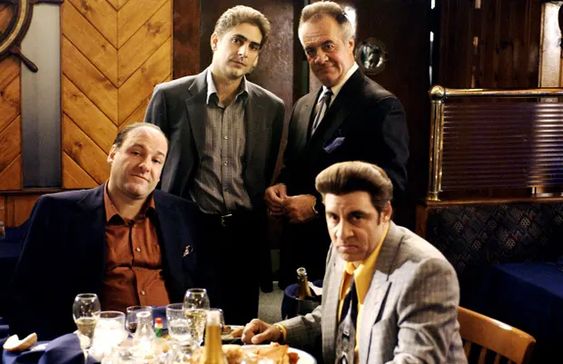
Introduction: Why ‘The Sopranos’ Is the Greatest TV Show Ever
For anyone who has ever watched The Sopranos, it’s clear why the show is often hailed as the greatest TV series of all time. From its groundbreaking storytelling to its complex characters and daring approach to taboo topics, The Sopranos set the bar for what modern television could achieve. Despite ending over a decade ago, its influence on TV shows, storytelling, and cultural narratives remains unmatched. But what is it exactly about The Sopranos that makes it stand out from all the other great TV shows? In this article, we’ll dive into 10 things that make The Sopranos the greatest show ever made.
1. Complex, Multi-Dimensional Characters
One of the key elements that set The Sopranos apart is its richly developed characters. Tony Soprano, played by James Gandolfini, is one of the most complex characters in television history. He’s not just a mob boss; he’s a father, a husband, a man with insecurities, and someone struggling with his mental health. The show dives deep into his psyche, showing how his personal and professional lives are intertwined.
But Tony isn’t the only character who feels real and multi-faceted. From Carmela’s struggle with the moral implications of her life to Christopher’s journey of ambition and self-doubt, every character in The Sopranos is multi-dimensional. The series doesn’t just paint its characters as good or evil—it explores their complexities, making them feel human and relatable, even if their actions are often far from ideal.

2. Revolutionary Storytelling
The Sopranos revolutionized television storytelling by blending deep character development with layered, long-form narratives. Each episode doesn’t just advance the plot; it takes the audience on an emotional and intellectual journey. The show’s ability to balance humor, drama, violence, and introspection in a single episode was groundbreaking at the time.
Furthermore, The Sopranos often blurred the lines between reality and fantasy. The dream sequences, psychological therapy sessions, and metaphor-heavy storytelling all played with the audience’s perception of what was real, keeping viewers engaged and constantly thinking. This unique approach paved the way for other shows to experiment with complex storytelling techniques.
3. Masterful Direction and Cinematography
The direction and cinematography of The Sopranos were nothing short of brilliant. The show used visual storytelling techniques to convey its characters’ emotions, motivations, and inner struggles without saying a word. From the iconic opening sequence to the subtle use of color and framing, every shot in The Sopranos was meticulously planned to serve the narrative.
The show’s visual style also added a layer of depth to its storytelling. For example, the stark contrast between the lush suburban lifestyle of the Soprano family and the gritty, violent world of the mafia underscored the central theme of duality in the show. The decision to film many scenes in wide shots allowed the audience to take in the full scope of a scene, giving them a sense of intimacy and distance at the same time.
4. Unforgettable Performances by the Cast
The cast of The Sopranos delivered performances that are still regarded as some of the best in TV history. James Gandolfini’s portrayal of Tony Soprano is iconic, capturing the character’s vulnerability and rage with nuance and depth. Gandolfini’s ability to convey Tony’s inner turmoil without relying on excessive dialogue made the character unforgettable.
Other performances, like Edie Falco’s portrayal of Carmela Soprano, Lorraine Bracco’s role as Dr. Melfi, and Michael Imperioli’s depiction of Christopher Moltisanti, are just as vital to the show’s success. These performances brought the rich, multifaceted characters to life, making the audience care about their fates—even when they were making terrible decisions.
5. Exploration of Mental Health
Before it became a trend in television, The Sopranos took on mental health as a central theme. Tony’s therapy sessions with Dr. Jennifer Melfi opened up discussions about anxiety, depression, and the effects of trauma, all while challenging stereotypes about men in therapy. These sessions were not just plot devices—they allowed for a deep examination of Tony’s psyche and, by extension, his actions.
Tony’s struggles with his mental health weren’t isolated; they reflected the emotional struggles of the other characters. Carmela’s battle with guilt, Christopher’s addiction issues, and the moral dilemmas faced by the entire Soprano family all tie into broader conversations about emotional vulnerability and psychological health.
6. A Groundbreaking Look at the Mafia
While The Sopranos is technically a mob drama, it’s much more than that. It provides a deep and nuanced look at the mafia world, not as glamorous or idealized, but as a morally corrupt and ultimately destructive lifestyle. Tony Soprano is a character who wields power and control, but at what cost? The Sopranos doesn’t romanticize the mafia—it explores its dark consequences, both for its members and for the people they hurt.
Through its depiction of the mafia’s inner workings, The Sopranos also brings in elements of organized crime that were rarely shown on TV before, including the complex family dynamics, the power struggles, and the constant threat of betrayal. It shows the mafia not just as a business but as a corrosive, toxic force.
7. Bold and Unpredictable Plot Twists
One of the trademarks of The Sopranos is its unpredictability. The show was unafraid to take bold risks, and often, it left the audience questioning everything they thought they knew about the characters and the plot. Whether it was a shocking death, a morally ambiguous decision, or an unpredictable twist, The Sopranos kept viewers on the edge of their seats.
For example, the shocking deaths of key characters—some who were beloved by fans—created moments of true narrative disruption. These unexpected events reminded audiences that no character was safe, heightening the tension and emotional investment in the story.
8. Complex Exploration of Family Dynamics
At the heart of The Sopranos is the exploration of family—both blood relations and chosen families within the mafia. Tony’s relationships with his wife, children, and mother form the emotional core of the series. The struggles he faces in trying to balance his violent career with his role as a father and husband resonate with the audience, even though his actions are often morally reprehensible.
The show masterfully delves into how family can be both a source of love and a source of stress, and how loyalty to one’s family can be a double-edged sword. The complexities of family life in The Sopranos are presented in a raw, unapologetic way that feels both universal and unique to the mob world.
9. Exploration of American Identity
The Sopranos also serves as a commentary on American identity. Through Tony’s life and the lives of those around him, the show critiques the American Dream. Tony’s quest for power and success, coupled with his existential doubts, challenges the conventional idea of the American Dream being achievable or desirable.
The show uses the Soprano family’s life in suburban New Jersey as a lens through which to view the contradictions and struggles inherent in American life. Themes of class, ambition, and disillusionment run throughout the series, offering a critique of both American society and the ideals that drive it.
10. Iconic Ending That Left Fans Thinking
The ending of The Sopranos is one of the most iconic—and divisive—endings in television history. The final scene, which cuts to black unexpectedly, has been the subject of intense debate since it aired. Was Tony Soprano killed, or was it just a reflection of the uncertainty and danger that characterized his life? The ambiguity of the ending was a bold choice that left viewers with lingering questions about the fate of the characters they had spent so many years following.
Rather than tying up every loose end, The Sopranos chose to leave some things open, allowing for endless interpretation. It was a perfect reflection of the show itself—complex, mysterious, and never easily understood.
Conclusion: Why The Sopranos is Unmatched in TV History
When you consider all the elements of The Sopranos—its character depth, storytelling, cinematography, performances, and bold narrative choices—it’s clear why it’s regarded as the greatest TV show of all time. The Sopranos wasn’t just a show about a mob boss; it was a show that explored the complexities of family, morality, mental health, and American society, all while pushing the boundaries of what television could achieve. Even years after it ended, its influence is still felt across the entertainment industry. It’s the show that changed everything—and for good reason.
5 FAQs:
- What makes Tony Soprano such an unforgettable character? Tony Soprano’s complexity, vulnerability, and internal conflicts made him a groundbreaking antihero, allowing viewers to empathize with his struggles despite his often immoral actions.
- How did The Sopranos change the landscape of television? The Sopranos revolutionized TV by combining rich character development with cinematic storytelling, paving the way for later shows like Breaking Bad and Mad Men.
- What is the significance of the final scene of The Sopranos? The final scene, which cuts to black unexpectedly, leaves Tony’s fate ambiguous, making it one of the most debated endings in television history. It reflects the show’s overall themes of uncertainty and danger.
- How does The Sopranos explore family dynamics? The series delves deep into the relationships between Tony and his family, showing how loyalty, love, and stress can coexist within a family, even when that family is involved in organized crime.
-
Why is The Sopranos considered the greatest show ever? The Sopranos is considered the greatest show due to its complex characters, revolutionary storytelling, memorable performances, and its ability to challenge and redefine the television landscape.
